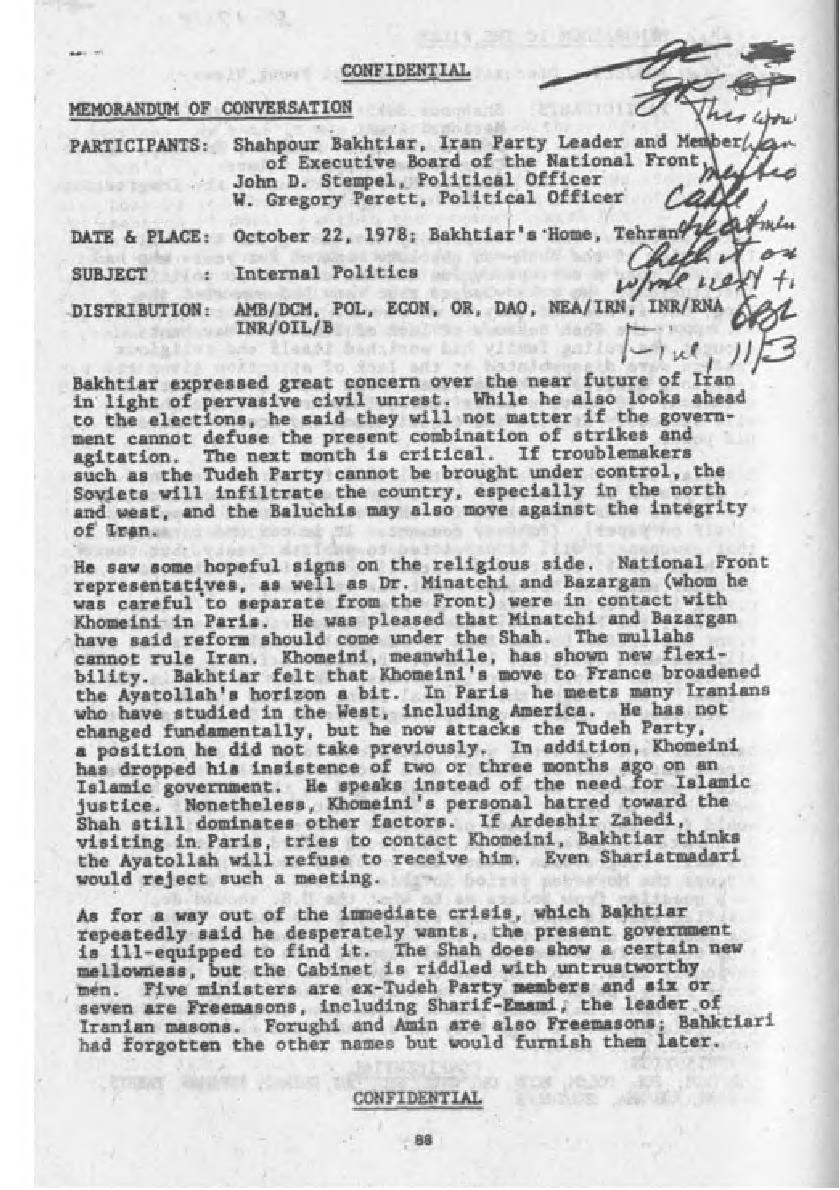CONFIDENTIAL
MEMORANDUM OF CONVERSATION
PARTICIPANTS: Shahpour Bakhtiar, Iran Party Leader and Member of Executive Board of the National Front
John D. Stempel, Political Officer
W. Gregory Perett, Political Officer
DATE & PLACE: October 22, 1978: Bakhtiar's Home, Tehran
SUBJECT: Internal Politics
DISTRIBUTION: AMB/DCM, POL, ECON, OR, DAO, NEA/IRN, INR/RNA, INR/OIL/B
Bakhtiar expressed great concern over the near future of Iran in light of pervasive civil unrest. While he also looks ahead to the elections, he said they will not matter if the government cannot defuse the present combination of strikes and agitation. The next month is critical. If troublemakers such as the Tudeh Party cannot be brought under control, the Soviets will infiltrate the country, especially in the north and west, and the Baluchis may also move against the integrity of Iran.
He saw some hopeful signs on the religious side. National Front representatives, as well as Dr. Minatchi and Bazargan (whom he was careful to separate from the Front) were in contact with Khomeini in Paris. He was pleased that Minatchi and Bazargan have said reform should come under the Shah. The mullahs cannot rule Iran. Khomeini, meanwhile, has shown new flexibility. Bakhtiar felt that Khomeini's move to France broadened the Ayatollah's horizon a bit. In Paris he meets many Iranians who have studied in the West, including America. He has not changed fundamentally, but he now attacks the Tudeh Party, a position he did not take previously. In addition, Khomeini has dropped his insistence of two or three months ago on an Islamic Government. He speaks instead of the need for Islamic justice. Nonetheless, Khomeini's personal hatred toward the Shah still dominates other factors. If Ardeshir Zahedi, visiting in Paris, tries to contact Khomeini, Bakhtiar thinks the Ayatollah will refuse to receive him. Even Shariatmadari would reject such a meeting.
As for a way out of the immediate crisis, whihc Bakhtiar repeatedly said he desperately wants, the present government is ill-equipped to find it. The Shah does show a certain new mellowness, but the Cabinet is riddled with untrustworthy men. Five ministers are ex-Tudeh Party members and six or seven are Freemasons, including Sharif-Emami, the leader of the Iranian masons. Forughi and Amin are also Freemasons; Bahktiari had forgotten the other names but would furnish them later.
CONFIDENTIAL
88
